Germany’s largely state-owned railways are famous for officering a relaxed, efficient and even jaw-droppingly beautiful way to travel. From breathtaking routes through the Bavarian alps to intercity trains connecting the old industrial hubs of the Ruhrgebiet, travelling through the country by train can be an experience in itself. And despite what some may say, it doesn’t have to break the bank either.
If you’re keen to see more of Germany by train, here are our top tips for finding cheap train tickets for your romantic weekend city breaks, business commutes and day trips.
With the right approach, train travel won’t just better for the climate, but better for your wallet than air travel too.
Book (and travel) at the right time
This is an obvious one, but when it comes to train travel, the early bird really does catch the worm. Tickets become available six months before the date of travel, and booking at the right time can mean bigger discounts and cheap tickets at more convenient times.
Back in 2019, the German Transport Club (VCD) conducted a review of Deutsche Bahn’s tickets to find out the best times to book. They concluded that up to a month before travel, almost every journey had discounted tickets available, with some of the highest discounts of around 55 percent.
These cheaper tickets were available right up to 24 hours before the travel date, but at this point, discounts were around 33 percent, and most of the discounted travel was for early morning and evening trains. Unsurprisingly, there tended to be fewer cheap tickets around on the Friday and Sunday trains used by commuters and weekend trippers alike.
As a rule of thumb, booking at least two weeks before you set off on your trip will ensure you have the best chance of securing a good deal. And if you end up booking last-minute, be prepared to set an early alarm to catch that train at sunrise.
Sparpreis or Super-Sparpreis?
Deutsche Bahn offers two main options for the budget-conscious traveller: the ‘Sparpreis’ (Saver Price) and ‘Super-Sparpreis’ (Super Saver Price). As you might guess, the super saver tends to be the cheapest option of the two, starting at an ultra low €17.90 per ticket – even if you’re planning to go all the way across the country from Berlin to Munich.
Meanwhile, the saver price stars at €21.50 per person, but the difference can be even more, depending on where you’re going and when.
That means getting a Super-Sparpreis ticket is generally going to be the slightly more wallet-friendly option.
READ ALSO: Could sleeper trains offer Germans cheap, low-carbon travel across Europe?
A word to the wise, though: before you open your DB Navigator app and start collecting Super-Sparpreis tickets like they’re going out of fashion, you should consider weighing up the pros and cons of each.
One big con is that the Super-Sparpreis can’t be cancelled – even for a fee – so if it turns out you’re unable to travel on the train you’ve booked, you’ll have thrown at least €17.90 down the drain (and possibly more).
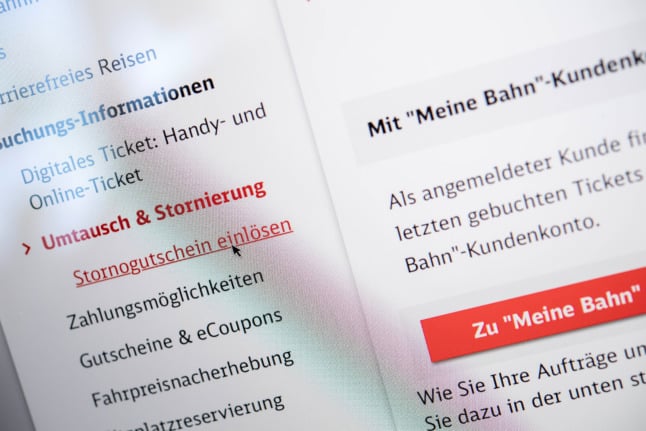
A customer uses a voucher from a cancelled ticket. While Sparpreis tickets can be exchanged for rail vouchers, Super-Sparpreis tickets can’t be cancelled or exchanged. Photo: picture alliance/dpa/dpa-tmn | Zacharie Scheurer
A pro of opting for the Sparpreis, meanwhile, is that it comes with a free City Ticket at your end destination, so if the price difference between the two is small and you plan to travel around the city a fair bit after you arrive, it could be well worth picking the Sparpreis option rather than the Super-Sparpreis.
Unlike the Super-Sparpreis, Deutsche Bahn will allow you to cancel Sparpreis tickets up to a day before you travel – though they will charge €10 to do so. So if you’ve bought a Sparpreis ticket from Hamburg to Berlin for €22, you can cancel it beforehand and receive a €12 travel voucher back, which is approximately the price of six hotdogs at your local in-station cafe.
In either case, you can buy saver tickets from six months before you travel, and the majority of ‘Super-Sparpreis’ tickets tend to be available for earlier bookers. Just log on to the DB website, head to ‘Sparpreis Finder’ and enter in your travel dates, destination and any railcards you may have. Both Sparpreis and Super-Sparpreis tickets are eligible for railcard discounts, so with a Bahncard 25, you could travel across the country on an ICE train for as little as €13.
Check your search settings
As well as the Sparpreis Finder, Deutsche Bahn’s website now offers a new service called ‘Best Price Finder’, which is ideal for more flexible travellers.
When you’re searching for your travel dates and destination, be sure to check the box that says “Show our best prices” (or “Unsere Bestpreise anzeigen”, in German). As you can see below, the best-price finder will then give you an at-a-glance representation of the prices throughout the day, from pricier peak times to the more budget-friendly early morning or late evening options.
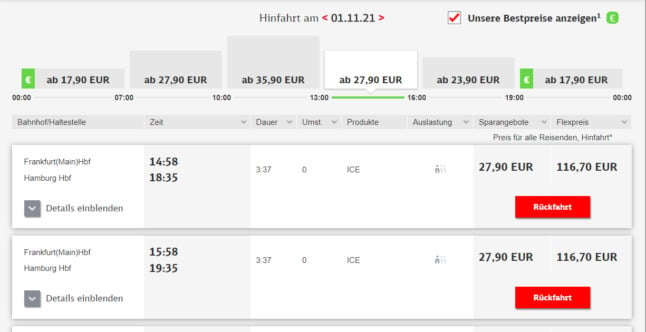
Deutsche Bahn’s ‘Best Price Finder’ shows mutiple prices for travelling between Frankfurt and Hamburg at different times of day. Source: Deutsche Bahn
If you’re not fussy about how long it takes to get to your destination, you can also search exclusively for ‘Nahverkehr’ (regional trains) or ‘Verbindungen ohne ICE’ (connections that don’t include the ICE intercity trains).
With a few notable exceptions, tickets for local travel tend to be a lot cheaper than the super-fast connections between major cities like Hamburg and Berlin. So if you’re going on a jaunt to Lübeck from Berlin, for example, you may find it cheaper to take regional trains through rural Mecklenburg instead of going directly to Hamburg and then switching to regional connections.
Opt for group tickets where possible
When it comes to booking cheap tickets in Germany, it pays to be popular. In fact, the more friends you have, the cheaper all of you can travel – though there are some deals for the solo traveller too.
Though the beloved Weekend Ticket was scrapped a few years back, it has since been replaced by similar deals that offer affordable options for day-trips, city breaks and group outings.
The latter can enjoy some super cheap tickets by opting for Group Saver Tickets, which can be purchased for groups of six or more. With this type of ticket, you and your friends can nab tickets of €9.90 per person in second class to travel all over Germany, or €27.90 in first class, if you’re looking for more of a champagne and oysters type experience. (Or at least a bit of leg room) For this type of ticket, you get your seat reservation for free, and children travel for half the price.

Time to get the gang back together? Groups of friends can enjoy great discounts on train travel. Photo: picture alliance/dpa | Matthias Balk
For smaller parties, the Quer durchs Land ticket can also work out pretty cheaply, especially if you’re travelling further afield than your home state. These tickets are €42 for the first person, and just €7 for each additional traveller. If you go right up to the maximum and travel as a group of five, each of you will pay just €14 for an unlimited days’ travel around Germany. And you can bring up to three children aged 14 or under along with you for free.
Want to keep it local? Then your best bet could well be one of the regional tickets offered in each of Germany’s 16 states. With these, up to five people can travel on unlimited trains around the region for a full day for anywhere between €22 and €42, depending on the state. Don’t get confused if you don’t see any of Germany’s city states on there: Bremen and Hamburg are included in the Lower Saxony state ticket, while Berlin and Brandenburg have a combined travel deal.
You should also bear in mind that, aside from the Group Saver tickets, these special deals generally don’t allow you to take the high-speed ICE trains or intercity trains. But if you don’t mind taking it slow on the regional trains (and possibly stopping off at some quaint villages and towns en route), these can be a fun and affordable option.
What about ‘split ticketing’?
If you’ve spent any time in the UK, you may well have heard of ‘split ticketing’ websites. The nifty algorithms on these third-party search portals scan all the possible ways of completing a journey between A and B and find cheaper prices by combining smaller, cheaper train routes to make an entire journey.
In Germany, the same thing is possible – though you don’t have the benefit of having an algorithm to do the legwork for you. However, according to transport blogger Jon Worth, this tactic can be used to save money if one leg of your IC/ICE journey is busy, when travelling on regional trains through different states or between various European countries.
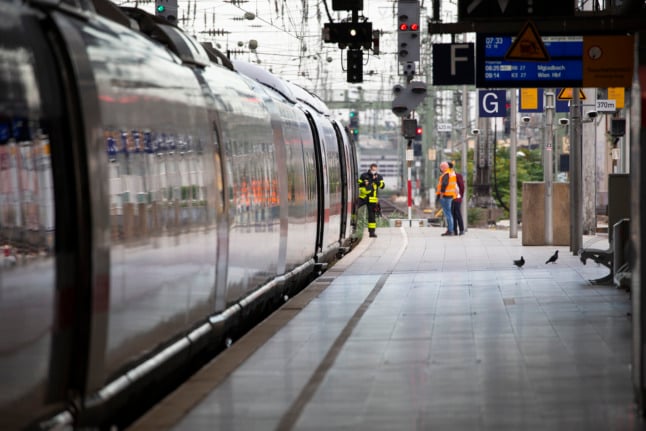
A train arrives at Cologne station. Photo: picture alliance/dpa/Thomas Banneyer | Thomas Banneyer
Split ticketing well is something of a fine art, but essentially, you find out the full train route by putting in your start and end destinations – say Berlin and Cologne – on the Deutsche Bahn website. Then you combine tickets for smaller legs of the journey until you have your full route – though (hopefully) cheaper than at the start.
If you’re starting your journey in big city like Munich, combining a short distance within the city (say, München Ost to München Hauptbahnhof) by long-distance train and the rest of your journey by EC/IC train can sometimes be a nifty trick to try. We’re not sure exactly why this works, but we’ve heard that it does!
If you don’t fancy spending too long connecting the dots of your journey or travelling with multiple tickets, however, a beginners’ option is to combine a monthly travel card or student semester ticket in your city with a ticket from just outside the city borders that goes to your destination. This won’t usually save you megabucks, but it does mean you aren’t paying twice for a travel zone you’ve already paid for.
Check competitors and third-party websites
If you’re scratching your head at the mention of ‘competitors’ in the German railways, we don’t blame you. Deutsche Bahn, the rail operator owned by the government, runs something approaching a monopoly in Germany – so generally you’ll need to stick with them.
However, there’s one smaller operator that may occasionally offer bargain rail tickets in some parts of the country. That’s Flixtrain, which is owned by the same company as Flixbus. These run between major cities like Stuttgart, Frankfurt, Berlin, Cologne and Hamburg a few times a day, and could offer a cheaper alternative to Deutsche Bahn’s ICE trains.
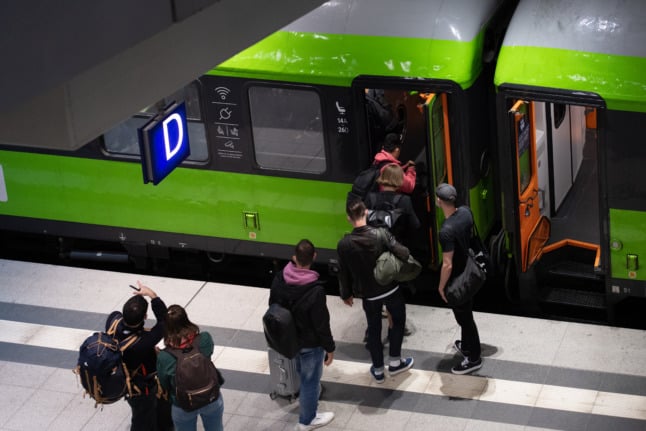
Passengers board a FlixTrain service in Berlin. Photo: picture alliance/dpa | Paul Zinken
Speaking of Flixtrain – remember that long-distance coaches can be a great, cheap alternative to train travel in a pinch (and most of them have free Wifi these days!). Alongside Flixbus, there are a number of other coach companies active in Germany – including Pinkbus, BlaBlaCar Bus and Eurolines.
READ ALSO: Travel: Five of the best day trips by bus from Berlin
Is it worth getting a Bahncard?
The short answer is yes, but it depends which one.
As you probably know, Deutsche Bahn offers multiple options for discount cards, ranging from the Bahncard 25, which gives you 25 percent off rail travel, through to the Bahncard 50 and Bahncard 100, which give you 50 percent and 100 percent off respectively.
For a Bahncard 25, the standard annual price is currently €55.70, which means you’d have to spend around €225 on train tickets each year to make it worthwhile. Once you start looking at the Bahncard 50, the price goes up to €229 per year, so you suddenly have to spend around €460 on train travel a year for the card to have value.
Plus, you can’t use the full 50 percent discount on your Bahncard 50 on (Super-)Sparpreis tickets, so a Bahncard 25 basically does the same thing most of the time anyway.
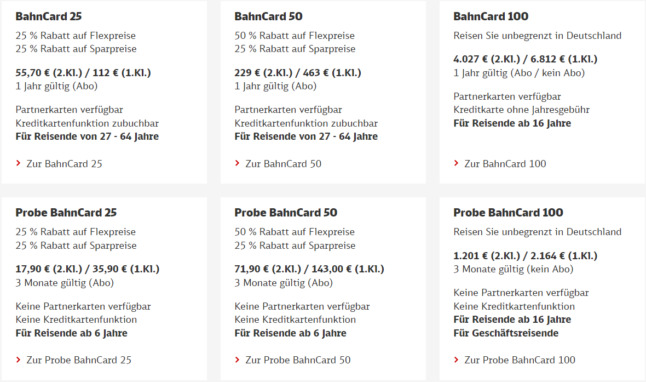
Comparison of German railcard prices as of October 5th, 2021. Source: Deutsche Bahn
If you want to get really nerdy about it, our friends over at the German Transport Club have created a Bahncard Rechner (railcard calculator) so you can see how much you’d save (or not) with each of the railcards on offer. Bear in mind that prices for railcards are due to rise slightly on December 12th, 2021 – so be sure to stay up to date.
READ ALSO: German rail operator Deutsche Bahn set to raise ticket prices
If you’re only planning to travel a lot at a certain time of year, DB have started selling ‘Probe’ (trial) Bahncards, which offer a discounted price for three months of use rather than the full year. If you purchase one of these in the Deutsche Bahn app, you can set the start date of the railcard to the same date as your journey to help you make the most of it.
Pro tip: if you’re under 26, over 65 or otherwise eligible for a concession, you can pick each of the railcards up much cheaper. Check out the Deutsche Bahn website for a full list of prices and options.

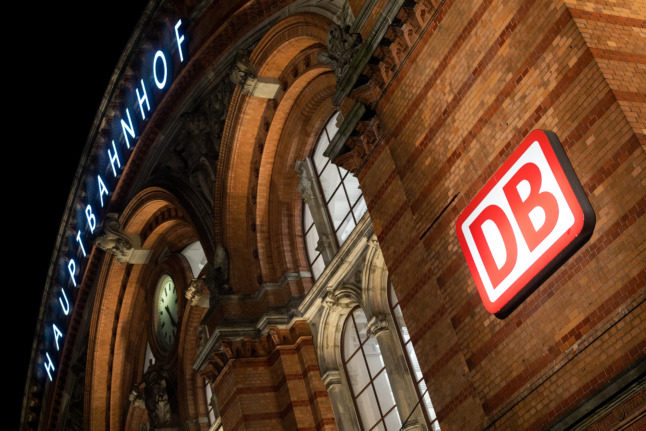

 Please whitelist us to continue reading.
Please whitelist us to continue reading.
Member comments